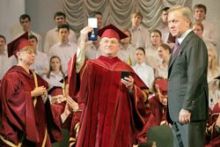The Tchaikovsky Ukrainian National Music Academy’s Opera Studio is one of the most interesting cultural centers since most of its performers are the Academy’s undergraduates and post-graduates who strive to modernize opera singing in our country.
In seventy years of its work the Opera Studio has formulated its artistic credo: deep respect for the classic art, daring innovations, original artistic thinking, and lofty stage fervor. It was a cradle for such outstanding opera singers as Dmytro Hnatyuk, Lidia Zabiliasta, Pavlo Karmaliuk, Ye. Kolesnyk, Mykola Kondratiuk, Anatolii Kocherha, Yevheniia Miroshnychenko, Anatolii Mokrenko, Valentyn Pyvovarov, Klavdiia Radchenko, Maria Stefiuk, Anatolii Solovianenko, and many others.
Volodymyr ROZHOK, rector of the academy, speaks about the Opera Studio’s present and future.
You have recently introduced a new major-musical direction. What music productions have been staged at the Opera Studio?
“Training of musical directors has extended the repertoire of the Opera Studio. Daring experiments, so much lacking in respected academic theaters, are always connected with the young artists’ creative activities. Some new operas were staged by promising young directors. For example, Gianni Scicci, the last opera from Puccini’s triptych, perfectly matches the temperament and esthetic preferences of the young director Vitalii Palchykov. Its brilliant premiere took place in 2008. The opera’s bright dynamic action, amazing plasticity, and a kaleidoscope of director’s non-standard solutions were highly appreciated by the audience.
“The extended repertoire enabled the young student directors to adopt practices from professional trainers. The opera Ward Number Six was a good example of that. Its young musical director, O. Senko, recreated the eventful character of Volodymyr Zubytsky’s opera in a dynamical, flexible, and, most importantly, convincing fashion.
“Unfortunately, the state pays little attention to the highly professional art. It is sad, but every educated person understands that opera supports a nation intellectually. Without lofty moral ideals embodied in operas we will not be able to identify ourselves as part of the European community. There are plenty of financial problems: only salaries are budgeted. We do not even dream about the rest that the Opera Studio badly needs for its operation: costumes, lighting, and stage sets.
“The most difficult thing is to update our properties, because it costs a lot. Still, we hope that the state will be able to help us solve that important problem. By the way, the props, lighting, and all the technical tools necessary for full-scale theatrical activity have not been modernized since the 1950s, when the studio moved into a new building. With our own efforts we built a new stage set and made new costumes for Peter Tchaikovsky’s opera Iolanta brilliantly staged by our graduate Iryna Nesterenko, but this was a drop in the bucket. That is why we will not be able to get out of this predicament without the support of the state.”
What other projects are you going to stage at the Opera Studio in the near future?
“High-level diplomatic negotiations about staging at our Studio the opera Maria de Buenos Aires of the world-renowned Argentinean composer Astor Piazzolla are under way. This work is being done by Olena Savchuk, a PhD student of the Department of Musical Direction. Palchykov, who graduated from our institution in 2008, is going to stage Carl Orff’s Wise Woman with the support of the German Embassy in Ukraine. We have plenty of plans for the near future-just follow our playbills.”







